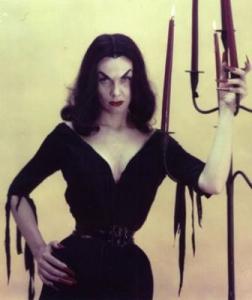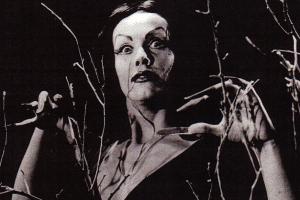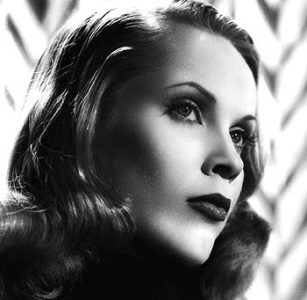By: debbie lynn elias
Many that know me or know of me, know of my passion for tv broadcasting, particularly the early days of tv during its infancy in the 40’s and 50’s. I saw first hand not only how local programming can explode on a national or iconic level, but the resulting sorrow of the lack of preserving this part of our history, not only from an historical technical standpoint, but for the individuals whose lives comprise these pieces of history. One of those individuals, Maila Nurmi, achieved cult status thanks to Los Angeles’ own piece of tv history – Vampira. And now thanks to R.H. Greene, with VAMPIRA AND ME we get not only an intimate personal portrait of Maila Nurmi but a look at some never before seen moments in television history.
As part of the recent Los Angeles Film Festival where VAMPIRA AND ME made it’s world premiere, I had a chance to posit some pointed questions to Green about VAMPIRA AND ME, filmmaking, preservation, and, of course, the wonderful Maila Nurmi, whom I had the privilege to meet on several occasions during her later years.
What prompted you to finally make VAMPIRA AND ME? How long ago were the seeds planted?
I always knew that Maila’s story was an amazing one, and also that she was an amazing person. But, as you’ll see when you watch the film, one of her life goals was to tell her story herself–and to do it properly, with the focus on who she was, the full range of what she accomplished, and what she actually lived through, and not just the loglines of Ed Wood, PLAN 9 and Elvira.
If you knew Maila, she was a very powerful person–you expected her to find a way to achieve her goals. But when it comes to telling her life story in a way that satisfied her, she never did. And in the meantime, she trusted me enough down the years to tell me a lot of the truth about herself–into microphones and on camera–and maybe to give me something even a bit larger than that.
I do remember that when I attended Maila’s funeral, which was absolutely lovely, a part of me was very mad at myself that I never went to her and said, “Look, let me do this for you,” because I was afraid, I think, that it could ruin our friendship.
The moment of truth came when an earlier documentary of mine [that] Maila was in called “SCHLOCK! THE SECRET HISTORY OF AMERICAN MOVIES”, was screened at the British Film Institute in late 2009,and I saw Maila onscreen just as I knew her for the first time since she passed. I had such a strong emotional reaction to seeing her again, and to hearing us converse
together, like we used to. I think that’s when VAMPIRA AND ME was born.

What was the most challenging aspect of bringing Maila’s story to life?
Doing justice to her, which no film could. She was just one of those people you never forget–so self-aware, and in her own way so very brave. And funny too by the way.
I went in knowing I would fail at capturing her fully, and willing to be satisfied if, in my own estimation, I came close. In that sense, I’m happy with what was achieved.
What is the one characteristic about Maila or moment or memory about her that makes the most indelible impression on you?
There are too many to name, but I can mention one thing in the movie that always makes me cry. It’s when Maila is talking about James Dean and she says, “Jimmy was from another planet, but then so was I…” and then she goes into a conversational monologue about loneliness and how the world felt to her that is so beautifully expressed, and all the more powerful because she doesn’t really understand how much she’s revealing about herself while talking about someone else.
Maila didn’t belong in the time she was born into, you know? And I think the fact that she managed to create a little island for herself called “Vampira” where she could change the rules is a remarkable act of will and imagination.
What is the most surprising thing that you learned about Maila during the years that you knew her and/or that you discovered in the process of making this film?
I would say that one surprising thing is how well Maila’s stories hold up. There wasn’t a lot of documentation on her life in 1997 when the original interview was conducted, but thanks to the viral explosion of the Vampira cult and, sadly, Maila’s own passing, which opened her personal archive up to scrutiny, it is much easier to check the details today.
She was almost always telling the truth about herself, without exaggeration. The story itself is so outrageous it could be hard to believe it was all true. But I continuously discovered it pretty much is.

VAMPIRA & ME brings to light a very important aspect of broadcasting tv history that is dear to my heart – preservation. Given your experiences with VAMPIRA & ME, and particularly the discovery of the George Gobel footage, do you believe that a documentary such as this will open the eyes (and wallets) of moviegoers and fans alike as to the need to preserve materials whenever we can?
I guess if it shows people just what a teeming, seething world the past is, and how vividly alive the visual artifacts it created can be, it could have some impact. The sad truth is that the orphan films
wither because no one can make money from them, and America seems to be going through a phase where the dollar sign is the face of God. But the optimistic skein is the internet, with its voracious hunger for imagery. Amateur collectors are now preserving things simply for the
cachet of putting them up on their blog. So the battle to preserve the past isn’t lost, and it’s far from over.
You self-funded the bulk of this film and then turned to Indie-Go-Go. I note that you feel short of the Indie-Go-Go goal. How does this impact you as a filmmaker for completing the film?
It just means my IRA account is more depleted than it might have been. And I’m okay with that. If I had it all to do over again, I think I would use starter though. I was hustled by an IndieGoGo exec at an IDA [International Documentary Association] event who told me he’d feature the film on the site and give it a personal push if I chose them over Kickstarter, and then he never responded to my emails or calls once I put the movie up on his site. Kickstarter gets more traffic, so that probably would have been a better way to go.

What did you personally take away from the experience of making VAMPIRA AND ME?
Too many things to name. But it’s been lovely having Maila in my life again on a daily basis for awhile longer.
What is the greatest gift that filmmaking has given you?
Anyone who finds a way to have a larger conversation with the wider world has to always remember it’s a privilege, not a right. As painful as making an independent film can be at times, the whole thing is a Gift.
#












